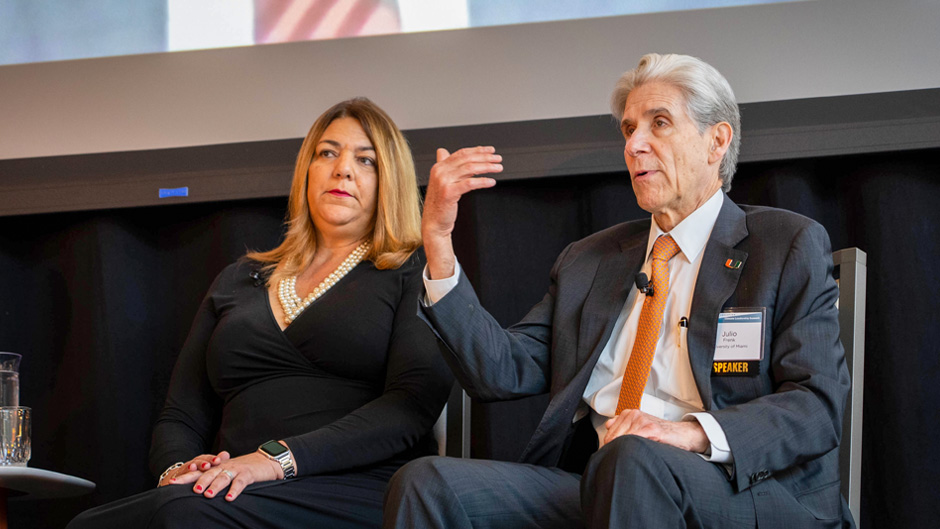University of Miami President Julio Frenk, along with many University faculty and staff members, joined leaders in sustainability and resilience from colleges across the nation Monday for the Higher Education Climate Leadership Summit, being held at the Coral Gables Campus.
“Due to our distinct geographic location, our aim is to transform the University of Miami into the destination for climate innovation,” said Frenk, during one of the opening sessions. “Conferences like this allow us to act as a convening entity; a place where we address global issues and allow scholars to establish ties that can endure and further develop in the future.”
In one of the morning panels, Frenk spoke alongside Madeline Pumariega, president of Miami Dade College, and Larry Robinson, president of Florida Agricultural and Mechanical University, to discuss their statewide collaboration to prepare campuses for the inevitable impacts of climate change. Frenk said he learned from the local origins of the COVID-19 pandemic how critical colleges and universities can be to share knowledge and solutions about a range of world issues, such as climate change.
“As we tackle global challenges, we need to do so rooted in local realities,” said Frenk, a noted public health expert. “And universities are exactly at the interface between the global and the local.”
Second Nature, which is co-hosting the conference along with the Intentional Endowments Network, is an organization committed to accelerating climate action in and through higher education. They guide many institutions in forming a climate action plan and working toward creating innovative climate solutions.
The University formed its own sustainability goals with the help of Second Nature 16 years ago, when it committed to achieving carbon neutrality by 2050, said Teddy L’Houtellier, the University’s director of sustainability. Last year, the University ranked No. 8 on the U.S. Environmental Protection Agency’s top 30 college and universities list for the largest green power users. The University also joined the EPA’s Green Power Partnership program for its environmental leadership.
“The challenges that we need to address with the climate crisis will require a strong collective effort, and that’s what Second Nature and the Intentional Endowment Network are for,” L’Houtellier said. “I’m thrilled to meet with all my colleagues who are working so hard on making their respective campus carbon neutral.”
On the final day of the conference Tuesday, three faculty members from the University will host a session titled “Emerging Resilience Research within the Climate Resilience Academy.”
In the session, Robin Bachin, an associate professor of history, senior associate dean for undergraduate education and director of the Office of Civic and Community Engagement, along with Landolf Rhode-Barbarigos, engineering assistant professor, and Cassandra Gaston, associate professor of atmospheric sciences, will discuss some of their research on resilience, community engagement, and climate-focused innovation in South Florida.
Many of the 300 attendees, like Jennifer Chirico, Georgia Tech’s associate vice president of sustainability, said she was eager to learn more about how to improve their campus resilience and further reduce their carbon footprint. Ken Shultes, associate vice president of sustainability and facilities planning at Dickinson College, is one of a small group of institutions across the nation that is carbon neutral, and said he was glad to be back at the first in-person conference after the pandemic. Despite Dickinson’s success, which includes building a solar power field and an alumni center that will soon have geothermal heating and cooling, Shultes said he is glad to be a part of a community that is devoted to finding sustainable solutions for college campuses.
“Higher education institutions really believe in this, so we are leading the way in how all organizations can achieve neutrality,” Shultes said. “And we have all these students, so if we make sustainability part of the learning experience, then our students who go on to work at a business, or own a business, will understand how to make things more energy efficient and less expensive.”

